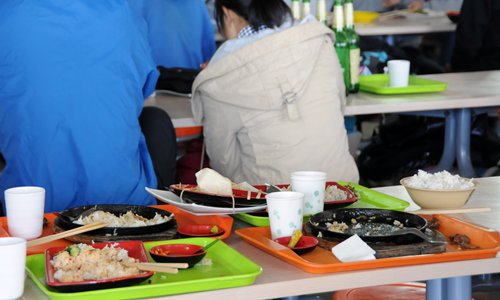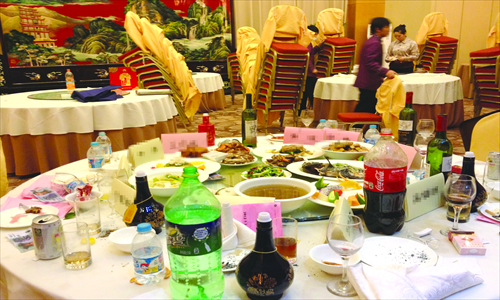
From the People's Daily App.
This is Story in the Story.
The United Nations Food and Agriculture Organization (FAO) statistics show that globally, up to one-third of all food, about 1.3 billion tons, is spoiled or squandered before it is consumed by people.
A recent event co-organized by the FAO and Tsinghua University gathered youngsters from across China to develop and present their ideas on how to tackle food loss and waste.
Three projects from 10 selective teams of two to five members aged between 18 and 35 were awarded prizes for their innovative solutions to food loss and waste in different scenarios using new technologies.
The winning team came up with an idea for an app that integrates blockchain, the Internet of Things and artificial intelligence to solve the sales problems of merchants' perishable foods and unsellable agricultural products.
The other two winners focused respectively on meal splitting and sharing in travel, especially for tourists who travel alone, and on solving food waste in university canteens.
Today’s Story in the Story looks at how China is increasing its sustainability efforts to reduce and recycle food waste across the country.

(Photo: VCG)
In a food waste recycling plant in Zhangqiu District in Jinan, East China's Shandong Province, piles of food waste, freshly delivered here from local restaurants and canteens, are waiting to be recycled - by cockroaches.
After being ground, the food is pumped into glass containers in the plant through a pipe, then devoured by millions of cockroaches.
For most people, cockroaches are pests that can leave an offensive odor, transmit viruses on their body surfaces and taint food. But Li Yanrong, a technician-turned entrepreneur from Jinan, has successfully turned them into professional recyclers after spending years studying the notorious insect.
At the recycling plant, which doubles as a cockroach farm, the roaches feed on 15 tons of food waste every day, more than a third of all food waste generated from Zhangqiu's restaurants and canteens.
Now, the roaches can not only decompose the waste leaving little residue, but also turn it into something useful.
After the cockroaches die, their bodies, known to have high protein and nitrogen levels, will be made into cockroach powder to be used as a protein source for animal feed.
The 54-year-old said the number of cockroaches are growing exponentially, thanks to their resilience and fast-breeding capabilities.
In 2014, there were only 400 kilograms of cockroaches in the plant. In 2015, the number surged to four tons, and this year, it's projected that over 3,000 tons of cockroaches will be produced here.
In some places in China, cockroaches are nicknamed "oil thieves" due to their penchant for oil and fermented food.
Cockroaches are also a raw material in traditional Chinese medicine, known to be able to promote detoxification.

(Photo: Global Times)
Li found there were already several roach farms in Shandong that provide raw material for medicine companies. Most of these family-run farms feed cockroaches with grain, and the cost for breeding each ton of cockroaches can hit $1,527.
But he strengthened his idea after An Feng, director of Zhangqiu's environmental sanitation center, told him about the difficulty of dealing with food waste. After landfill, food waste can pollute groundwater and result in health issues for residents. So why not feed cockroaches with food waste?
In October 2011, Li bought a fish tank and started to breed his own cockroaches. After getting his wife's permission, he obtained dozens of cockroach eggs, known as ootheca, placed them in the tank, and started to observe the reproduction habits of the cockroaches in his toilet.
In order to test the cockroaches' eating habits, the couple started to feed the roaches with different kinds of food - spicy, sour, even rotten. It turned out the nymphs had no sense of taste or smell at all. They also have strong immune systems that allow them to digest virtually anything.
Before, Li heard that cockroaches were filthy bugs that defecate on their own food. Through observation, he found that cockroaches never defecated or crawled over what they ate. They usually circled the food and ate from the outside to the inside. They also eat in turn, rather than squeezing against each other.
Li also tested the cockroach powder and found that chickens fed with the powder were not only healthier but also grew stronger and faster than normal chickens.
By the end of 2015, Li had resigned from his old job and launched his own company, committing himself fully to the cockroaches - and his recycling plant.
(Produced by Nancy Yan Xu, Lance Crayon, Brian Lowe and Paris Yelu Xu. Music by: bensound.com. Text from Global Times and China Daily.)


